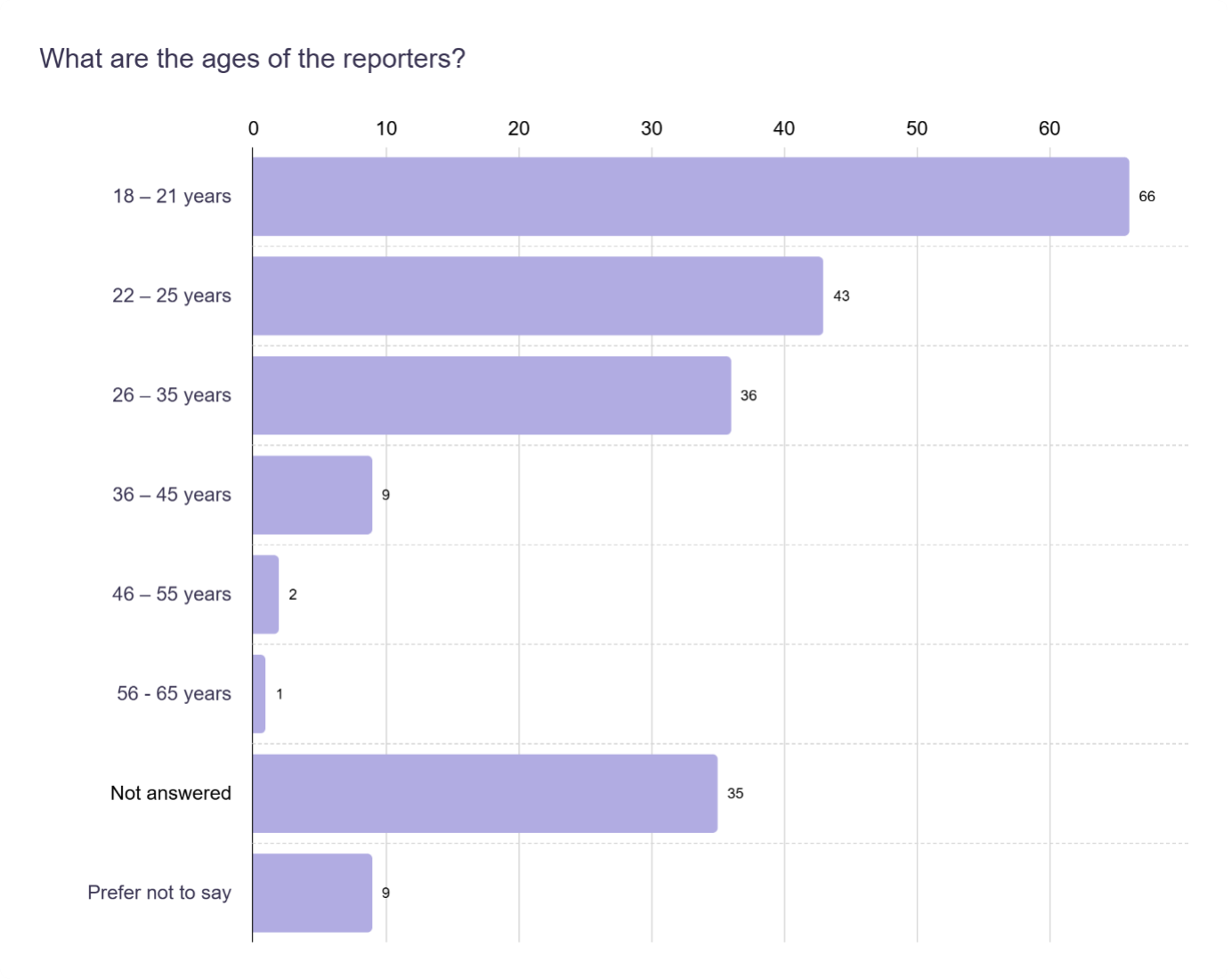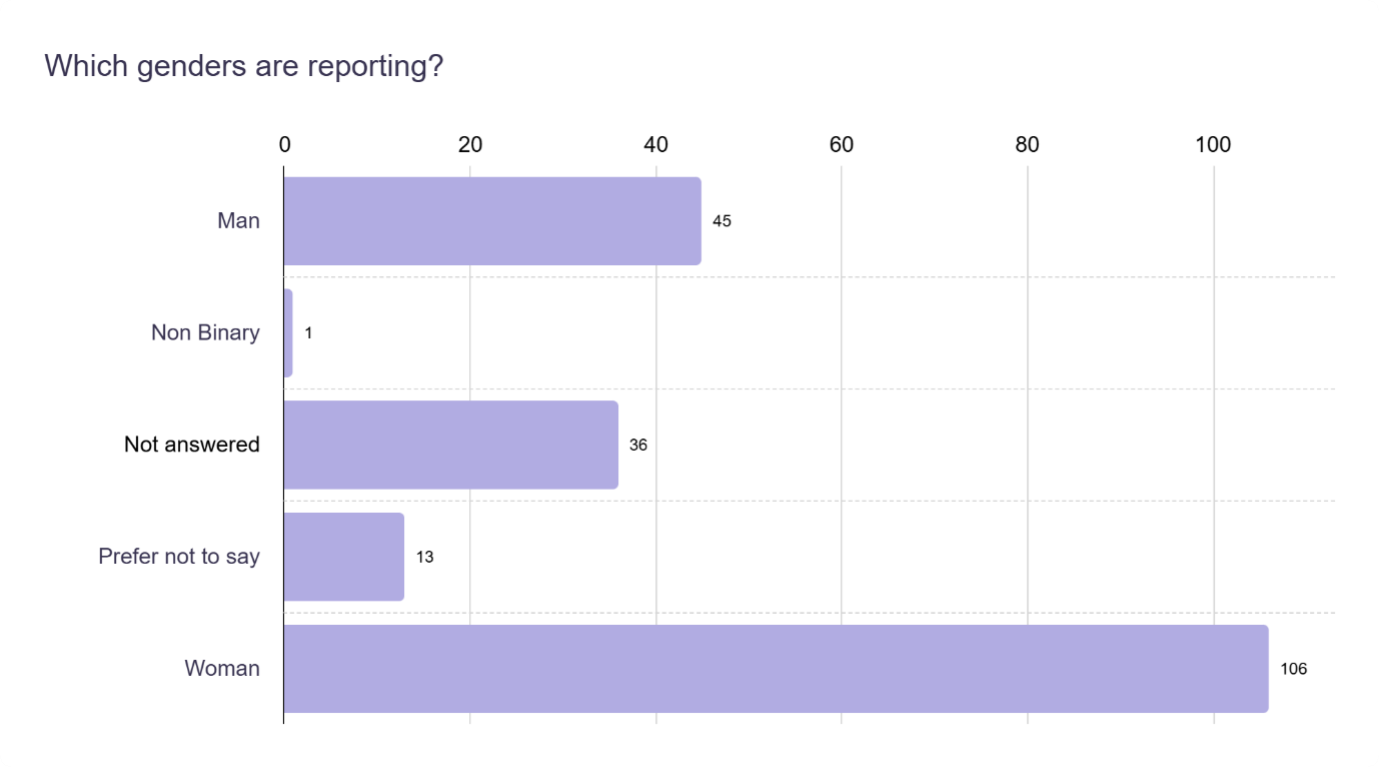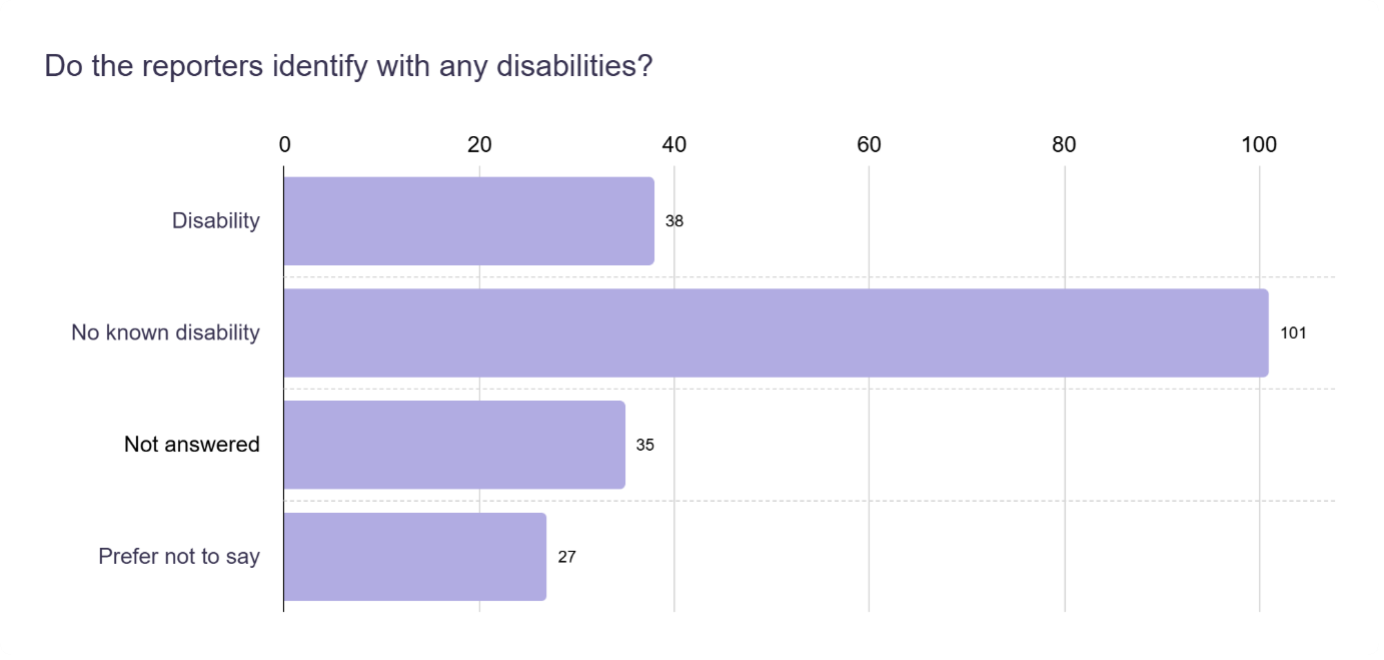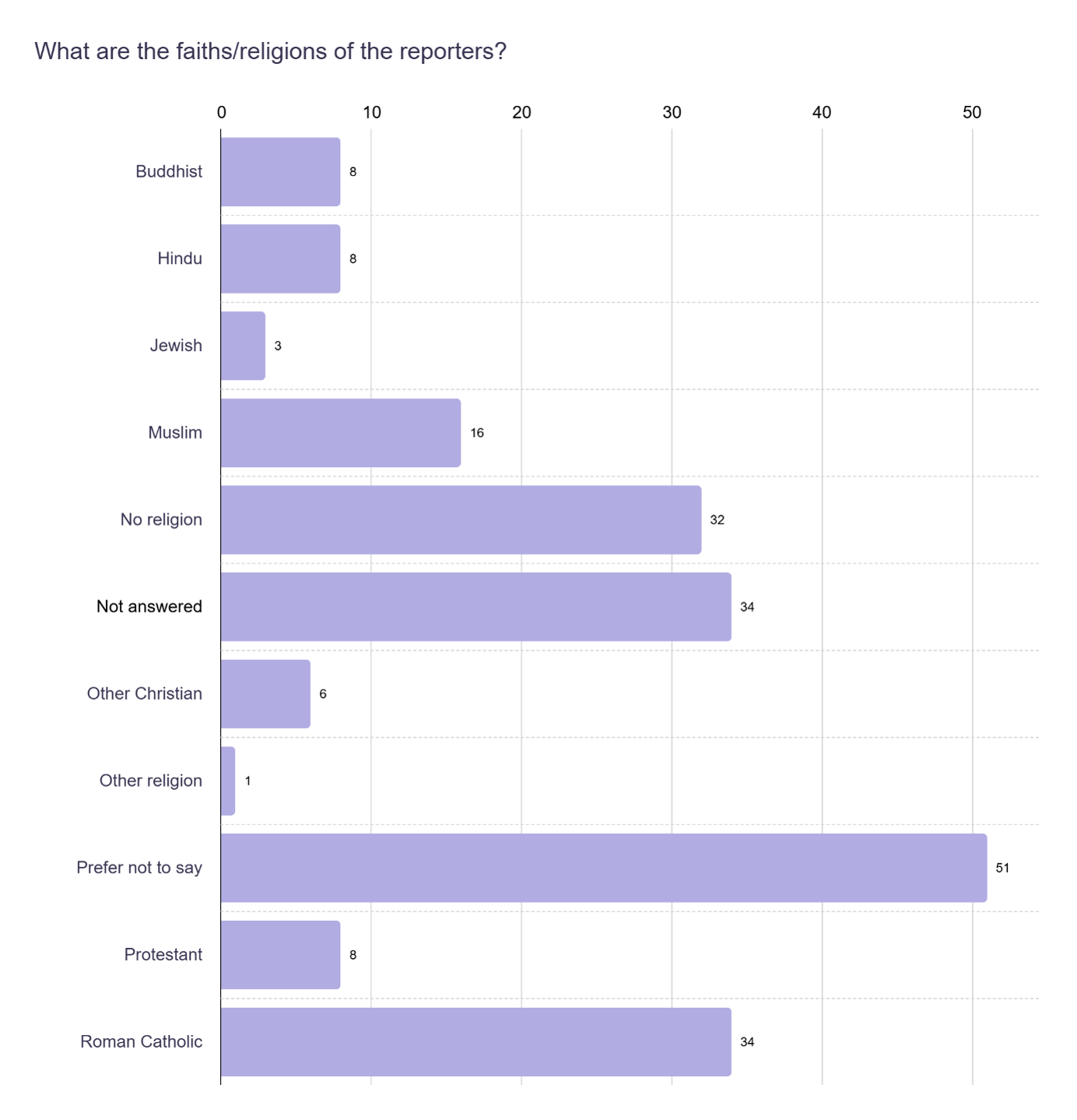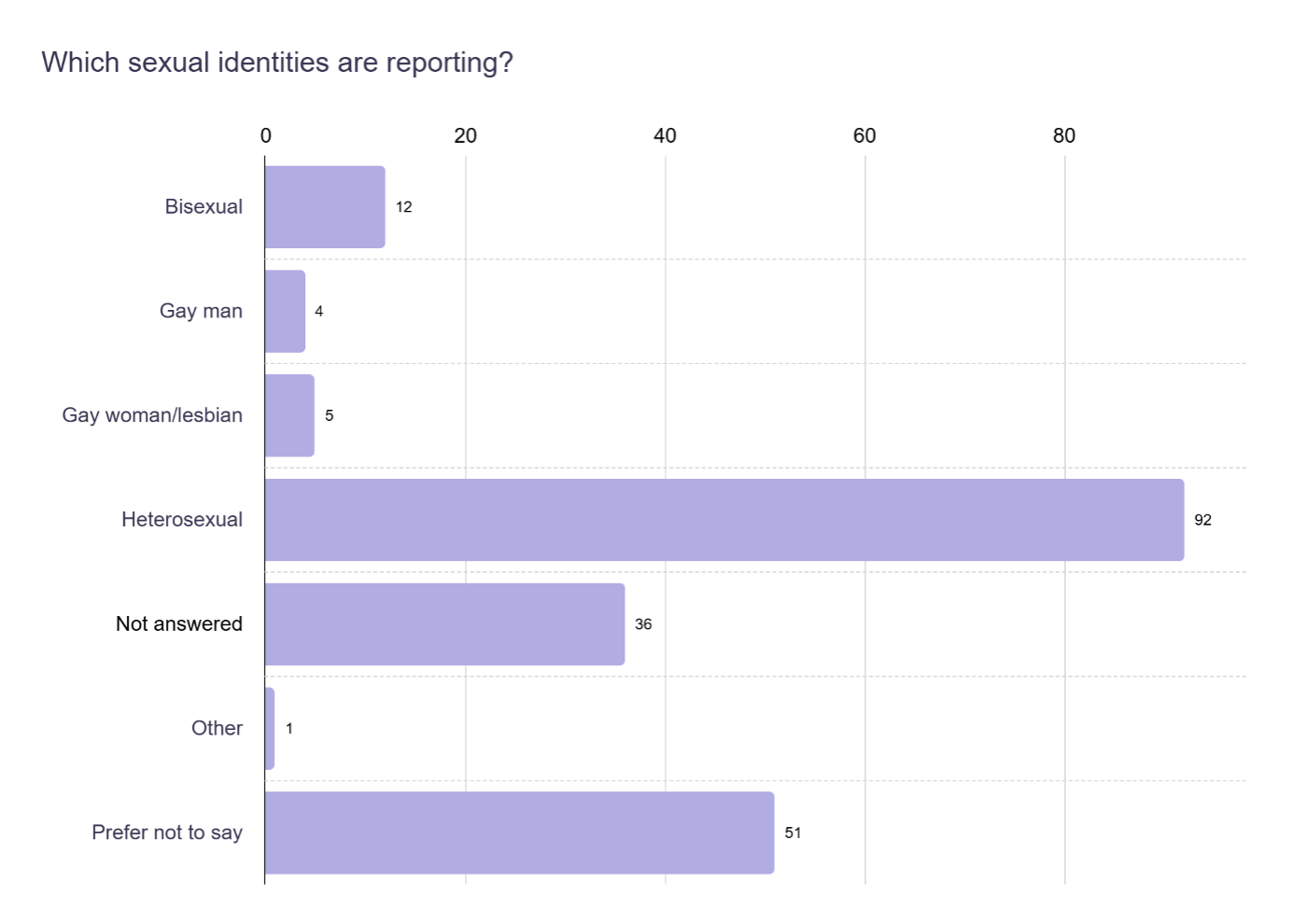Introduction
Report + Support Impact Report for the academic year 2023-2024 provides a comprehensive overview of the support offered to students through the Safe and Healthy Relationships (SHR) strand of the Student Wellbeing service at Queen’s University Belfast. It gives an overview of the reports, outcomes, initiatives and progress made throughout the year. This report aims to deliver transparency, evaluate performance, and outline plans to enhance the University environment and ensure the safety and wellbeing of the student population.
Report + Support is an online platform used by many institutions across the UK, providing a mechanism for students to request and access support if they have been impacted by:
- bullying
- harassment
- sexual misconduct
- domestic abuse
- online abuse
- scams
The system is currently designed to only report on behalf of students, however Individuals self-report against a list of categories, allowing for the reporter to select one category or multiple depending on how they view their situation.
The system was first launched in January 2019 and provides students the opportunity to report in one of two ways:
- Anonymously – When reporting anonymously, personal details are not recorded and the information reported remains However, this means the University is not able to offer direct advice or support to the person reporting. Students are asked not to include identifiable information of an individual, whether that individual is the alleged perpetrator or the person they believe to be a victim of the behaviour.
- Request support from a Safe and Health Relationships adviser - This option can be used by any QUB student or staff member to request support on behalf of a student. Any information shared is treated in a sensitive, non-judgmental and confidential manner and is reviewed to put students in contact with a SHR. For the context of clarity in this report these will be called Direct Reports.
Students are reminded that reports are treated by the University as informal, and do not initiate a formal complaint at this stage – the report initiates a meeting with a trained advocate to discuss support options.
Data collected, including anonymous reports, is analysed to monitor and evaluate trends. It is important to note that there could be double counting in the data as students may report anonymously initially and then go on to request support from a member of the team.
1. Summary of Key Findings
- There were more direct reports (a report with contact details provided) made this academic year (136) compared to the previous year (121). An increase of 12% which could suggest students are more confident in seeking direct support from an advocate.
- The main categories reported during the academic year were Harassment, Bullying and Other. (The Other category covers a wide range of topics including physical assault, police involvement, etc. Reporters usually tick the ‘other’ box when completing a report alongside other categories).
- There was an increase in reporting of domestic abuse by 115% from 13 cases to 28 cases in 2023/24.
- There was a decrease in reports of hate crime in the academic year by 45%. This was due to an abnormally high reporting rate in the previous academic year.
- The main reason identified for reporting was to inform the University without any formal or informal action being taken.
- Many students explained the issue was causing them distress and affecting either their wellbeing, safety and/or studies.
- Most of the students reporting were female and studying at undergraduate level.
- The main method for finding out about Report + Support was online searching at 48, followed by staff referrals at 37 and campus promotions at 23.
- Queens Business School had the highest total of students reporting, closely followed by Arts, English and Languages and History, Anthropology, Politics and Philosophy.
2. What is Report and Support?
Report and Support is an online platform designed to allow students within the Queen’s University community to report issues related to either bullying, harassment, sexual misconduct, domestic abuse, online abuse, scams and spiking. Students can report and ask for support regardless of whether an incident happened on or off campus or if the alleged perpetrator is a staff member, student, or neither. The incident may also be historic, but the individual needs support, or it may be a live or recent incident.
The system is built to:
- Provide a confidential space for individuals to report incidents.
- Offer access to support services and resources through meetings with Safe and Healthy Relationship Advocates
- Provide individually tailored access to options which may include assistance with reporting to police, raising a University complaint, or going through informal resolution depending on the circumstances of the case
- Enable the University to monitor and respond to issues in a timely and effective manner.
- Promote a culture of safety, respect, and inclusion within the QUB community.
Key Features of Report + Support include:
- Anonymity Options: Users can choose to report issues anonymously or with their identity revealed.
- Support: Direct links to support services such as out-of-hours phone numbers and campus security.
- Follow-Up Mechanisms: Assurance of follow-up actions for reported incidents to ensure support and options for resolution.
- Educational Resources: Information is provided on the support pages, including definitions of categories and details of local support providers.
Updates to the Report and Support System
- In the academic year 2023-24, updates to the questions at the report stage were made to streamline the process for students and improve the assessment process so that students can get the correct support in a timely manner.
- For instance, questions were added to give students options of what potential outcome they would like, and they are also asked to choose a statement of how this issue has impacted them.
- Another purpose of the changes was to give students as much choice and control in the process as possible by using trauma-informed principles.
3. Delivery of Action Plan from the Previous Impact Report 2022-2023
The previous Impact Report focused on several key priorities to improve the effectiveness and reach of the Report and Support system including appointing student consent ambassadors to deliver peer-based events, continuing to support the work of the Safe & Healthy Relationship Advocates, developing work on the Ending Violence against Women and Girls agenda led through DfE and also organising domestic abuse training for the Student Wellbeing Team.
Here are the major achievements:
- 3 Consent ambassadors were recruited in September 2023 and took the lead on organising awareness raising events to promote support services, including Report + Support. This included piloting a self-defence class in October 2023, and following positive feedback, a further series of 4 sessions were held in April, with many students expressing increased confidence in their ability to protect themselves as well as fostering positive self-esteem.
- Another area of work was hosting coffee drop-ins across campus to raise awareness of consent and support available. These were a good opportunity to interact with students and have meaningful conversations about consent.
- The ambassadors also organised a Valentines event in BT9 to promote healthy relationships and organised an event around St Patricks day to raise awareness of spiking. The event was also attended by PSNI, NEXUS, QUBSU, etc and an infographic on spiking awareness was launched.
- A successful bid was made to the Queen's Annual Fund for funding for a consent campaign. Some preparatory work took place in the academic year to develop the Got Consent? campaign with a view to this being launched in the 2024-25 academic year.
- Further training with Safe and Healthy Relationship Advocates- streamlining the system
- Ending Violence Against Women and Girls - highly productive collaboration has taken place between SU, societies, QUB accommodation and neighbourhood engagement to progress the work of EVAWG. This included funding for the delivery of enhanced licences for the safety app Hollie Guard.
- A pilot was trialed in partnership with the Appeals, Conduct & Complaints Team to introduce an informal resolution option for students who were reluctant to go through a formal complaint
- A session was delivered by Women’s Aid on domestic abuse to the Student Wellbeing Team in September 2023.
4. Understanding the Numbers
How are students reporting?
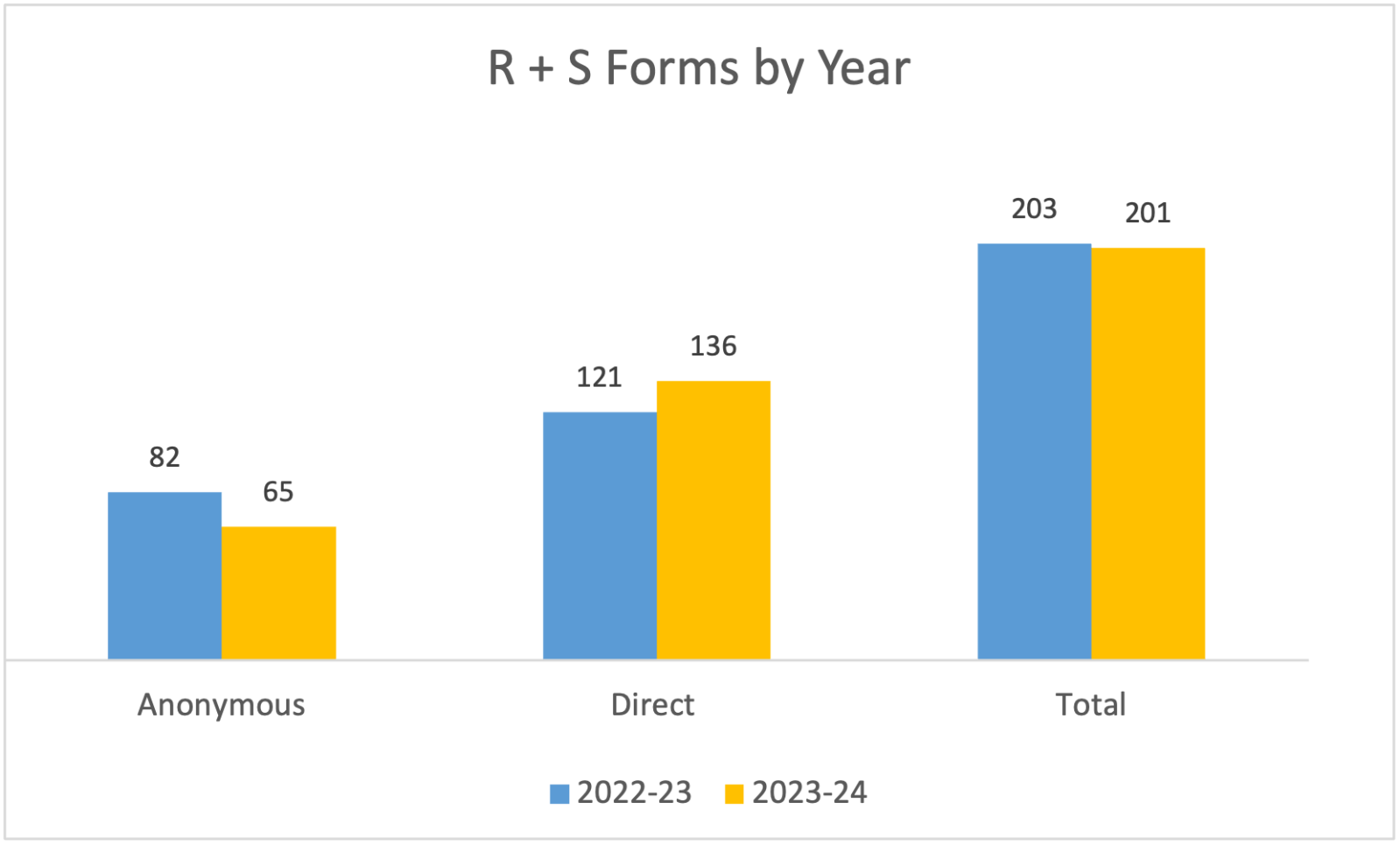
As stated there has been an increase of direct reporting this year by 12% and a decrease of anonymous reporting of 21%. This could be because students now have the option to add their contact details at the end of completing an anonymous report. It also suggests there is an increase in confidence for students to speak to a member of Report + Support team directly and receive help.
What are students reporting?
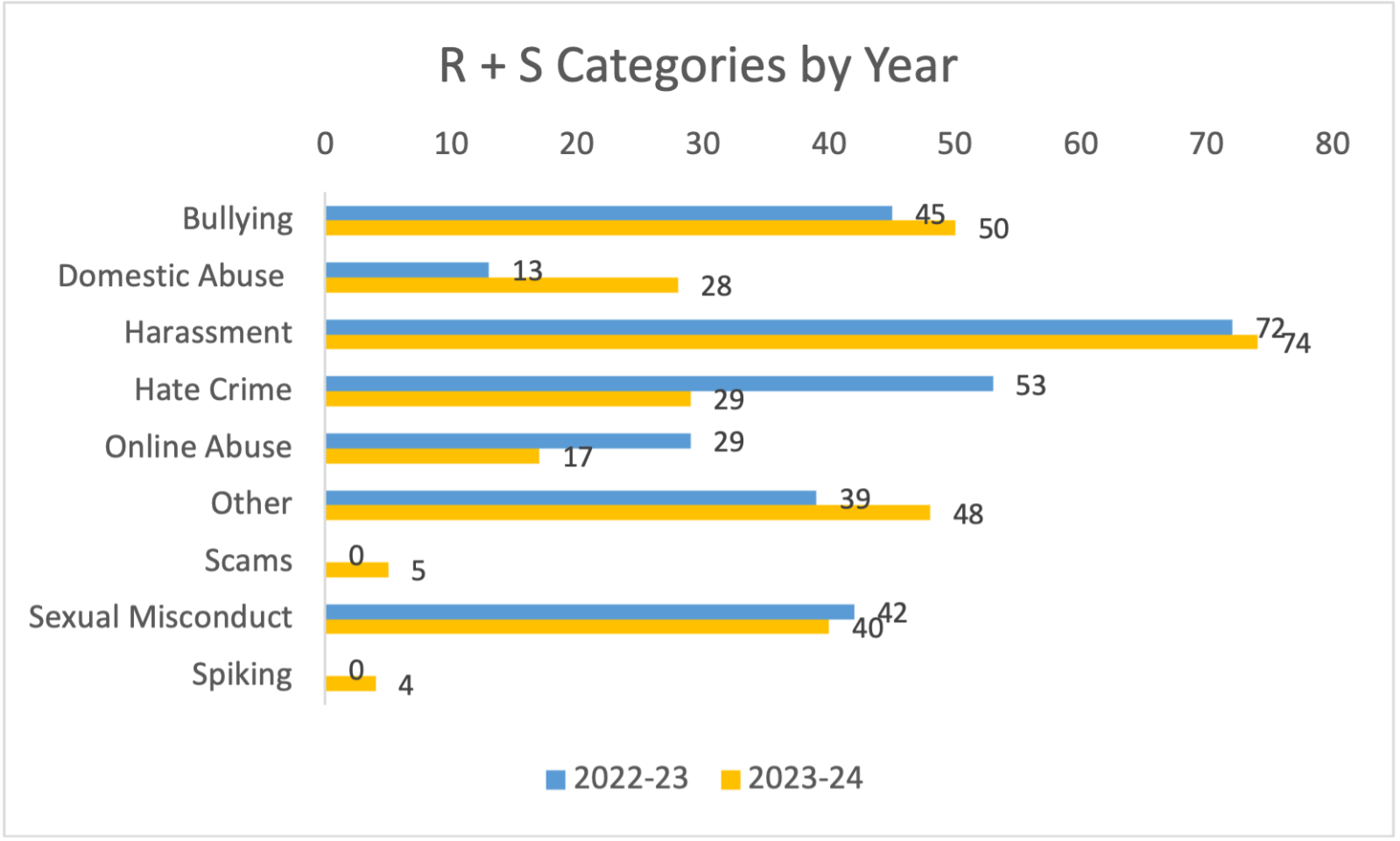
Bullying and harassment continue to be the main categories reported, which is consistent with the previous year and often are selected together when students are reporting. Within the harassment category, a total of 10 cases also highlighted sexual misconduct, indicating that the possible motivation was sexual harassment. Domestic abuse saw a big increase in reporting of around 115%, albeit from a low base initially. Hate crime reduced significantly which was attributed to a specific situation in November 2022 creating a spike in hate crime reporting. Due to this situation, the university put measures in place to address this. Finally, because of new emerging themes such as scams and spiking, which previously were covered under other separate categories were created and associated campaigns delivered to raise awareness.
When do students report?
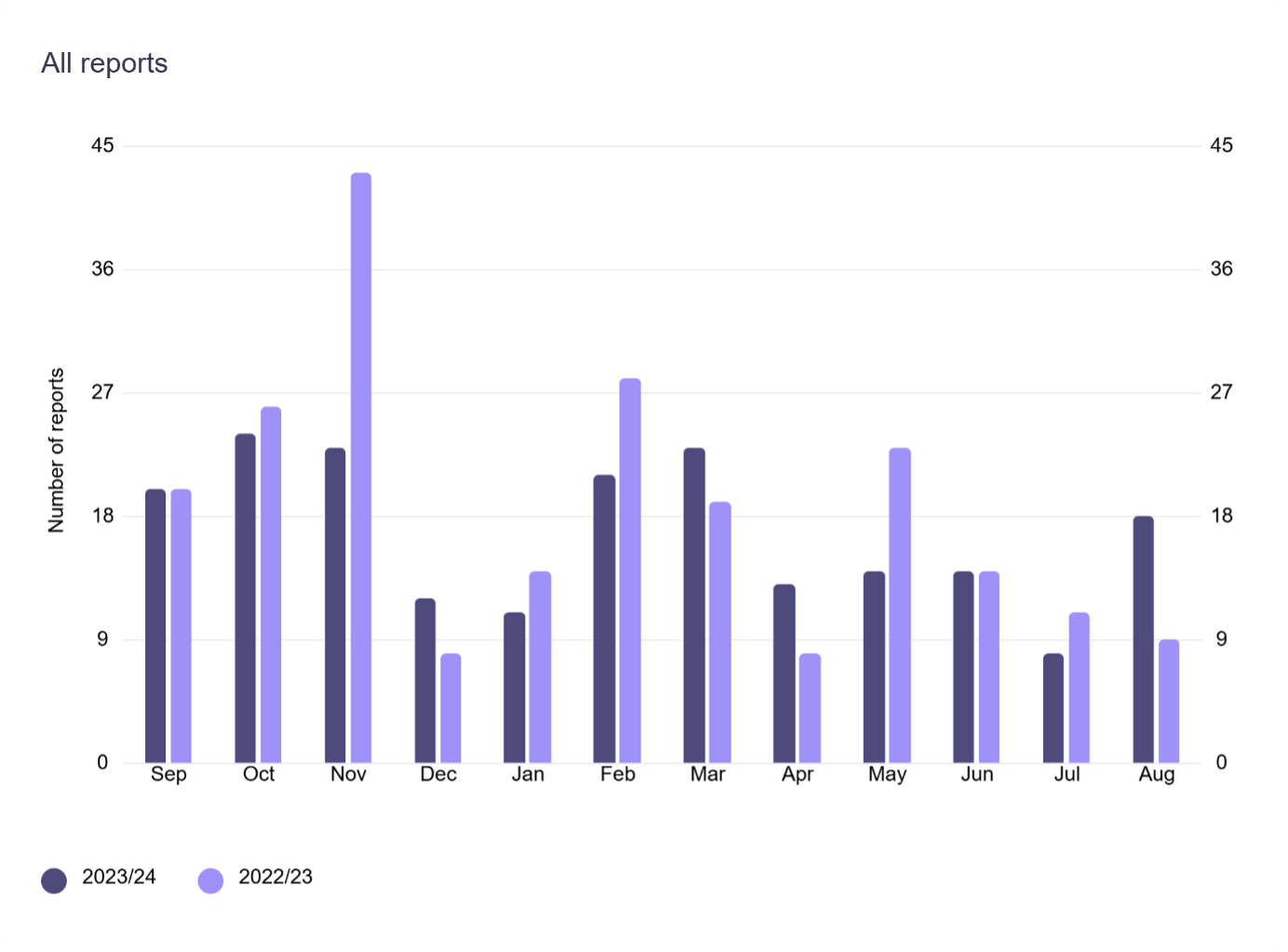
The chart shows the peak periods of reporting in 2023-24 compared to the previous year. While both years took a similar trajectory, there was a significant increase in reports this year during October 2023, February 2024, March 2004 and August 2024. The August spike was directly related to students being impacted by hate crime incidents caused by the civil unrest across Belfast and wider UK.
The table below shows the number of reports from each School listed by category. Most reports pertain to Schools within the Faculty of AHSS, which is in part explained by the fact that AHSS student population equates to half the total student body. The level of reporting by School has variable factors, including students possibly more aware of their rights and more willing to come forward, or the level of awareness raising within that School. The data is therefore helpful in identifying if targeted initiatives in particular Schools and Faculties would be useful, depending on the level of reporting and issues being reported. Research would show there is significant underreporting of these issues, which is often due to a variety of reasons including confidence to come forward, fear, embarrassment and or lack of trust in reporting systems.
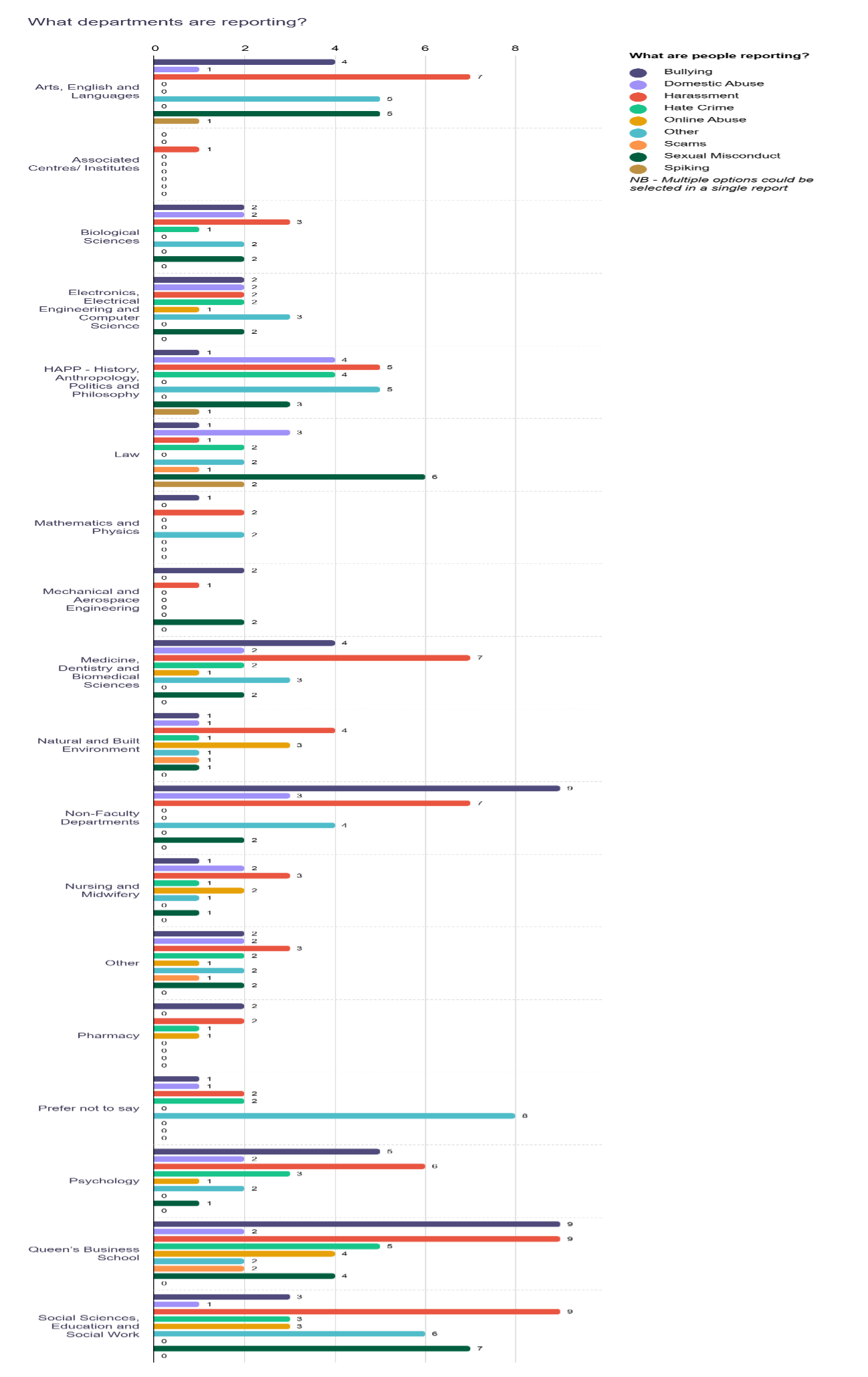
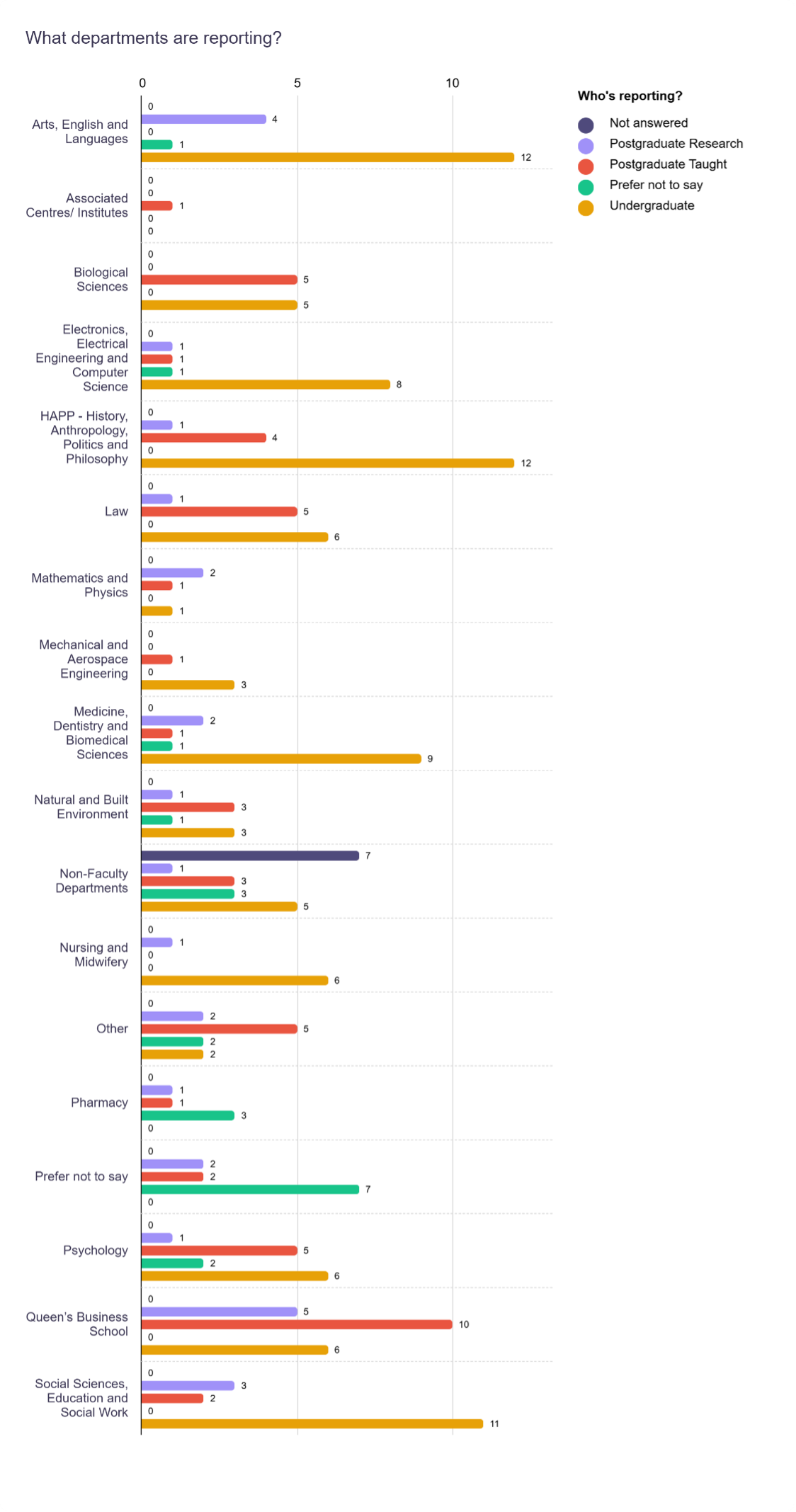
The table above highlights the number of students reporting by School/Department in relation to the study level. It should be noted that the graph aligns with the general population of students by School and Student level i.e. Schools with high reports of undergraduate reports such as AEL, HAPP and SSESW will usually have a higher proportion of undergraduates whereas Schools with high reports from postgraduates such as Queens Business School will have a higher proportion of students studying at this level.
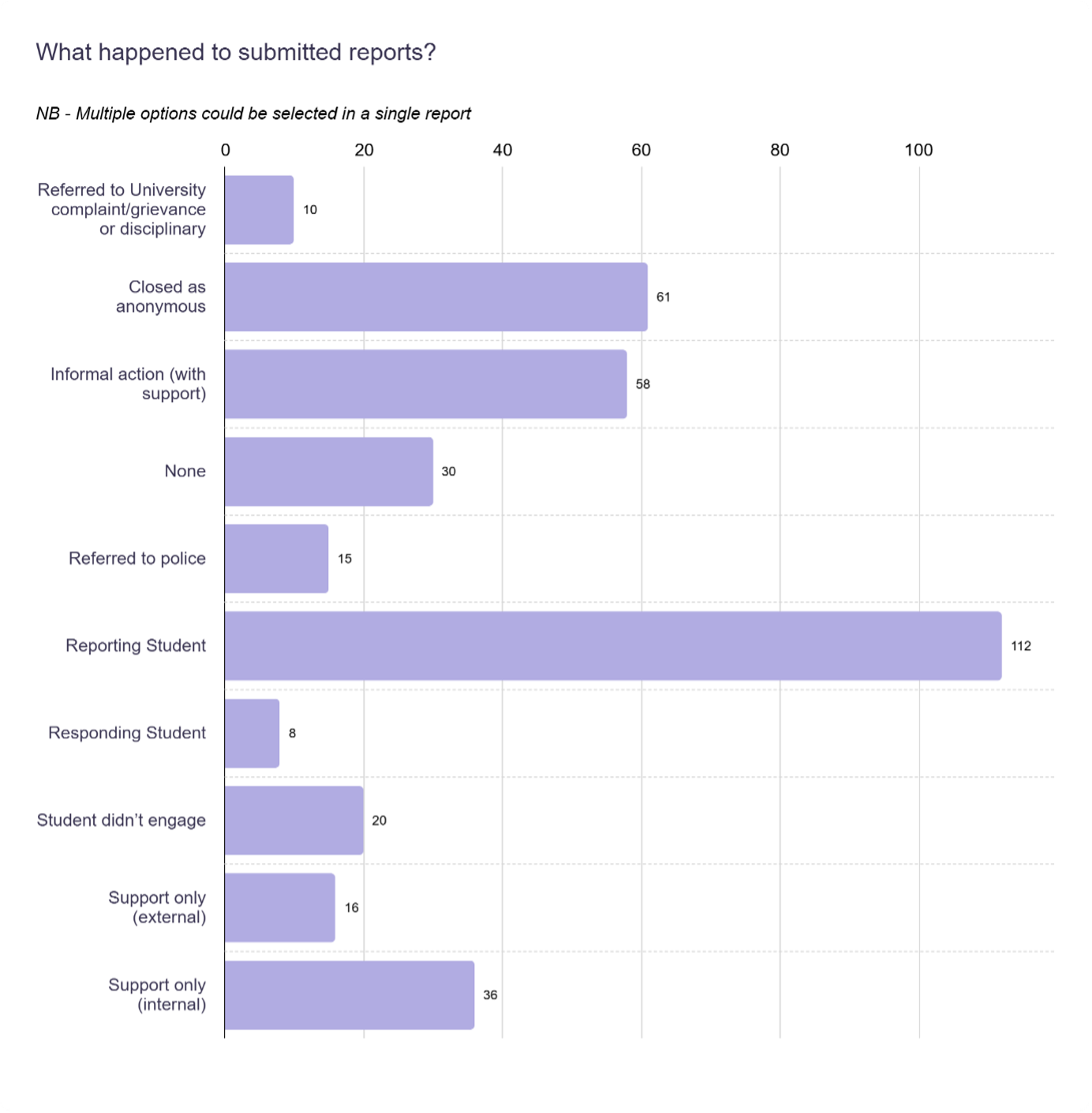
At case closure, Advocates complete an outcomes list indicating the most appropriate supports a student has received. From the table above, the majority of students will receive informal support i.e. meeting with an advocate to discuss the details of their case. 36 students received internal support, which could indicate either the Advocate contacting the student’s School with their consent to share appropriate information or help with getting extensions or taking time out of their studies. Some students can also be referred or signposted to external agencies with their consent, including Police, Nexus, Women’s Aid, or Victim Support. 20 students did not engage with support after completing a report, which can be common occurrence associated with people who have experienced some level of trauma. Students are contacted and offered to engage with support at any stage when they are ready.
5. Student Feedback
At case closure, students are sent a link to a short feedback questionnaire and are given the option to complete this. Below is a breakdown of the results.
- When asked on a scale of 1-5 (1 being difficult to 5 being easy how did you find navigating Report + Support), the average score was 4.33
- When asked how they found completing the form- 61% said straightforward, 16% simple, 11 difficult, 8% other and 2% said complicated.
- When asked how anxious or worried they felt before meeting an Advocate (1 being not anxious/worried to 5 being extremely anxious/worried) the average score was 4.17
- When asked how anxious or worried they felt before after meeting an Advocate (1 being not anxious/worried to 5 being extremely anxious/worried) the average score was 2.06
- 61% of respondents said they were happy with support, 30% somewhat happy, 2% neither happy or unhappy, 2% somewhat unhappy and 2 % were very unhappy
- 86% of students said would recommend the service to others
Students are also asked to give some written feedback on their experience of using the service. Below is a selection of comments.
"Very impressed with the services offered. They care for the students; they are willing to listen to the students and they try their best to assist the students. "
"The members of staff I interacted with were kind, helpful and quick to direct me to useful resources"
"Great service. My Advocate acted with the utmost professionalism and sensitivity. They patiently listened to my concerns, provided reassurance and guided me through each step of the process with empathy and understanding. The process can be overwhelming but knowing that there has been someone there to offer assistance whenever needed provided me with a sense of security and confidence. Thank you!"
"I felt like this service provided me a lot of support especially when discussing the case with the head of my course - I was really relieved that member of your team was able to sit through meetings with my school with me and have follow up meetings to see how I was doing. I think without this I would’ve found it much more difficult to feel confident during these other meetings with the head of my course and it would’ve felt a lot more difficult standing up for myself in these meetings so thank you."
"I feel this service has provided me with the support I needed to navigate a very challenging time in my life. Without the support from this team, I am not sure I would have been able to continue with my studies. "
"I think the process should be made clearer to students, they should know upfront what the different stages of the complaints procedure are to make more informed decisions about whether they want to proceed or not"
"Although my problems are still ongoing, Report + Support and Student Wellbeing have been supportive during this time."
6. Action Plan for Academic Year 2024-2025
To build on the progress made, the following action plan has been developed for the upcoming academic year:
- Recruitment of new consent ambassadors to continue the work of peer-directed learning and awareness-raising events, including delivering consent workshops
- Launch of the 'Got Consent?' campaign, including promoting infographics and a student-led video throughout campus to raise awareness
- Piloting a drop-in service on campus to offer students the opportunity to meet with Sexual Offences Legal Advisers from Victim Support NI, who can provide free legal advice and support to victims and survivors.
- Continued support of the Safe & Healthy Relationship Advocate team, including providing access to appropriate training
- Monitoring and Evaluation: Implement regular reviews of the Report + Support system, including feedback from students and reviewing data on usage of the support pages.
- Participate in a new institutional group tasked with overseeing the policies, procedures and support for students involved in or victims of misconduct, including serious misconduct
- Participate in a Tertiary Sector Working Group on Ending Violence Against Women established by DFENI and involves representatives from HE, FE and associated colleges in Northern Ireland, along with government representatives and the PSNI. The purpose of the group is to identify strengths already within the sector and to identify areas for collaboration aligned to the EVAWG Strategy.
7. Equality Monitoring Data
Students have the option to identify with a particular age, gender, sexuality, disability, ethnicity, religion and belief. This data allows for tracking and identifying areas of specific communities that may need targeted support.
